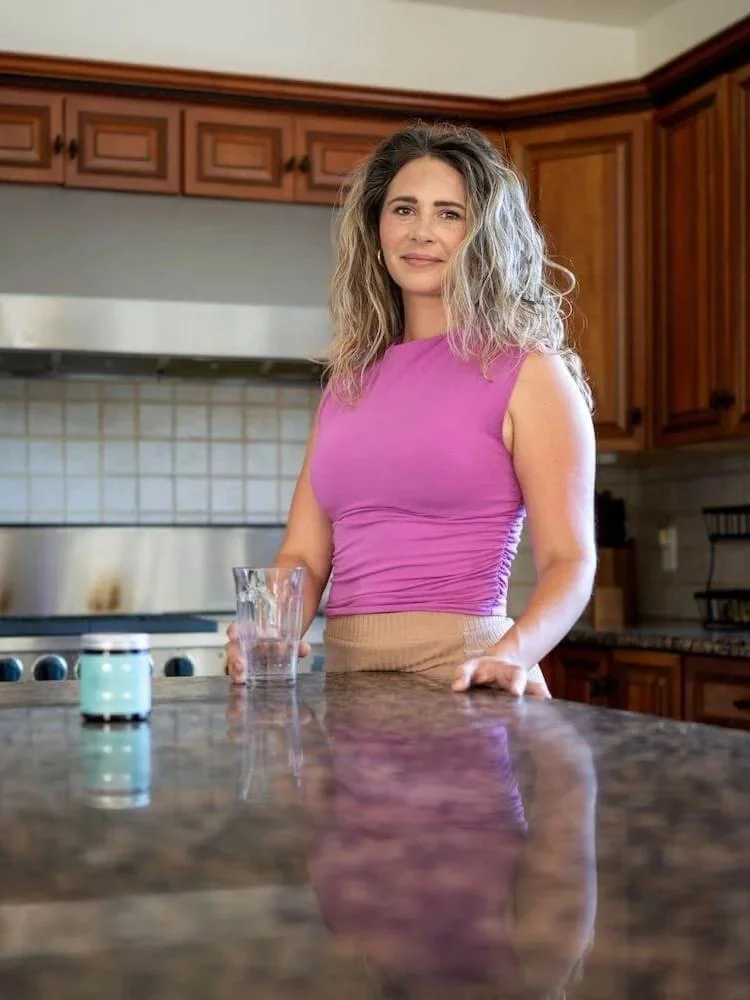Choosing a Quality Protein Powder
You know I love educating you on the ingredients to look for in your products. So, we’re going to dig into protein powder and what you should look for in a high quality protein powder! I often hear the question, "What one should I use?" So, I'll be sharing some of my favorite protein powders. Although I don't use all of them every day — I mean, who really needs ten protein powders, right? — they have all earned my stamp of approval.
Before we get into it, I just want to preface this by saying that of course I'll always share the products I personally use and love, but remember, you're free to explore other options that align with your preferences. My goal here is to empower you with knowledge about ingredients.
So let's get started!
Exploring Your Options
First things first, protein powders come in various types, such as vegan and whey. Personally, I consume both grass-fed whey and vegan protein powder, depending on the season and my preferences. During summer, when I'm all about those refreshing smoothies, grass-fed whey finds its way into my blender. In winter, when I crave something warm and comforting like protein oatmeal, I often opt for vegan protein. It's all about finding what works best for you!
When it comes to whey protein – look for grass-fed.
It has to be grass-fed. If it isn’t grass-fed, that means they’re being fed with corn or soy, and all the chemicals that went onto the feed are going to end up in your protein, and we don’t want that.
When it comes to vegan protein, there are plenty of options like brown rice, soy, pea, and hemp. I'm NOT a fan of soy when it comes to protein. Sure, in its natural fermented state, soy can be a source of beneficial phytoestrogens, like flax seeds. That's a plus, right? But here's the thing…
Most soy seeds are genetically modified (GMO) and heavily sprayed with glyphosate and other chemicals.
That takes soy out of the "phytoestrogen" category and puts it into the not-so-helpful "xenoestrogen" category. And let's not forget that finding high-quality, organic soy in the US is like searching for a needle in a haystack!
Now, let's move on to other protein powder options that are soy-free and offer fantastic alternatives. Hemp protein is a great choice. It provides a good balance of protein and other essential nutrients. Another great option is brown rice protein, but be mindful not to go overboard on the carbs. We do love our carbs, but let's aim for those with a low glycemic index to maintain stable blood sugar levels.
The Importance of Heavy Metal Testing
Lastly, we have pea protein, which is fantastic, but it's important to ensure that the brand you choose undergoes heavy metal testing.
Let's talk about peas for a moment. If you're simply enjoying peas at home, there's no need to worry about their naturally occurring lead levels. I mean, rice naturally contains arsenic, right? But I rinse it thoroughly and cook it in extra water, then discard the water. We're exposed to some degree of heavy metals every day, and that's okay. But when we're talking about concentrated pea protein, it's a whole different story because it’s so concentrated.
Imagine squishing all those peas down and transforming them into a protein powder. Now, picture yourself taking a big scoop of that powder, containing a whopping twenty grams of pea protein. It's essential to ensure that it's heavy metal tested, especially for lead.
Now, most brands won't openly share their heavy metal testing results because, well, let's face it, they're not exactly proud of them. Don't hesitate to reach out and ask for their testing information. It's crucial to prioritize your health and ensure you're consuming a protein powder that meets the highest standards. Don’t settle for brands that want to keep that info hush-hush!
Sneaky Additions: Fillers, Sweeteners, and Carcinogens
Alright, let's dive into some of the other things you might come across in protein powders. Some brands love adding not-so-friendly ingredients like carrageenan, artificial sweeteners, and sugar alcohols.
Carrageenan is often used as an emulsifier or filler, but here's the kicker: it's a known carcinogen. Yikes! We definitely want to steer clear of that one.
Now, let's talk about artificial sweeteners. Sucralose, oh sucralose, you deceptive little devil. It's a common ingredient found in numerous protein powders, but it's not doing any favors for our gut health. In fact, studies have shown that sucralose can lead to gut issues and even make us more insulin resistant. That's definitely not what we're aiming for. So, let's skip the sucralose and choose better alternatives.
But we do want to strike a balance. I mean, we don't want our protein powder to taste like dirt, right? Fear not, my sweet-toothed friends! I prefer using monk fruit or a touch of cane sugar in moderation — less than six grams, to be precise. These options provide a hint of sweetness without causing blood sugar spikes. Stevia is another alternative, but buyer beware! Not all stevia products are created equal. Some companies may sneak in additives or bleach it. We want plain and pure stevia, no funny business.
Beyond Protein: Oils, Organic Ingredients, and Dyes
Now, let's talk oils. Sunflower seed oil, safflower oil, and soybean oil — those are the ones we want to watch out for. They often find their way into protein powders, but they're not doing us any favors. Seed oils can lead to inflammation and other health issues, so it's best to avoid them.
Oh, and let's not forget about the organic factor! Glyphosate, the infamous herbicide, tends to lurk in non-organic products. If you want to steer clear of that unwanted chemical (and I definitely recommend that you do!), opt for organic protein powders whenever possible.
And finally, let's use some common sense. If a protein powder looks like a magical unicorn explosion with vibrant colors and sparkles, chances are it's loaded with artificial coloring. We don't want that in our bodies!
So, when you're searching for the perfect protein powder, here's your checklist:
✔ Whey - Grass-fed.
✔ Pea Protein - Check for heavy metal testing.
✔ Soy - Say bye-bye.
✔ Carrageenan, artificial sweeteners, artificial flavors, and seed oils? Cross them off the list.
✔ Avoid glyphosate - choose organic brands.
✔ And let's not forget the obvious - no sparkles or artificial coloring, please.
Brands I Love
Organifi
When it comes to vegan protein powders, I'm a big fan of Organifi. They offer delicious chocolate and vanilla flavors that I absolutely love. I often add them to my oatmeal or use them to make protein balls, and let me tell you, they're absolutely scrumptious! What sets Organifi apart is that they not only taste great but also test for glyphosate, which is a major plus considering the rainwater contamination issue.
Equip
Now, if you're looking for something different, let's talk about Equip. It's a beef protein powder that's basically like gelatin but without the jiggly texture. It's perfect for making protein hot chocolate. Equip doesn't contain any fillers, so you'll need to blend it or use a frother to incorporate it properly. Just a heads up, Equip does contain stevia, so if you're sensitive to that sweetener, it might not be your cup of tea. But if you're like me and enjoy a cozy protein hot chocolate at night, Equip is a great choice.
Nuzet
If you're into pea protein, Nuzet is a brand worth considering. They test for heavy metals, which is a big plus. Some of my clients rave about the taste, while others aren't as fond of it. It's a hit or miss in terms of flavor, so you might want to give it a try and see how it suits your taste buds.
Kion
Lastly, let's talk about Kion. They offer grass-fed protein powders, and I personally use their chocolate and vanilla options. I find both flavors delightful, but there's just something about the chocolate that makes it my favorite. Kion is also my go-to for amino acids and organic coffee when I'm not in the mood for mushroom coffee.
Plus, if you use the code LEAH, you can save on your Kion purchases!
Stay informed, make wise choices, and nourish your body in the best possible way.
Now, remember, these are my personal preferences, but YOU are the ultimate authority on what goes into your body. Take a close look at the ingredients, check for testing, and choose what works best for you!
P.S. This journey is all about awareness and knowledge — I want to help you make simple, daily lifestyle changes. I’m not here to tell you to throw out everything in your cupboards and start over! So, finish up any protein powder you currently have before making a switch. Don't worry, you won't keel over if you have another scoop — it's about reducing overall toxin exposure in our daily lives. And if you haven't already, make sure to check out the other resources we have for transitioning to a more non-toxic lifestyle!
Switch & Ditch Guide
Non-Toxic Product Swaps
Simple product swaps and recommendations to help you remove toxins and chemicals from your life! This guide will support you in choosing less toxic options when it's time to purchase your everyday products again.
Additional Resources
The recommendations presented in this blog are not a substitute for medical advice from a qualified doctor. Before making any changes to your diet and lifestyle, please consult with your health care provider.
Some of these links contain affiliate links.




